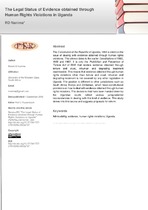| dc.contributor.author | Nanima, Robert D. | |
| dc.date.accessioned | 2018-06-05T12:13:20Z | |
| dc.date.available | 2018-06-05T12:13:20Z | |
| dc.date.issued | 2016 | |
| dc.identifier.citation | Nanima, Robert D. (2016). The legal status of evidence obtained through human rights violations in Uganda. PER/PELJ, 19. | en_US |
| dc.identifier.issn | 1727-3781 | |
| dc.identifier.uri | http://dx.doi.org/10.17159/1727- 3781/2016/v19i0a727 | |
| dc.identifier.uri | http://hdl.handle.net/10566/3772 | |
| dc.description.abstract | The Constitution of the Republic of Uganda, 1995 is silent on the issue of dealing with evidence obtained through human rights violations. This silence dates to the earlier Constitutions of 1962, 1966 and 1967. It is only the Prohibition and Prevention of Torture Act of 2012 that renders evidence obtained through torture and cruel, inhuman and degrading treatment inadmissible. This means that evidence obtained through human rights violations other than torture and cruel, inhuman and degrading treatment is not covered by any other legislation in Uganda. The position is different in other jurisdictions such as South Africa, Kenya and Zimbabwe, which have constitutional provisions on how to deal with evidence obtained through human rights violations. The decisions that have been handed down by the Ugandan courts reflect various jurisprudential inconsistencies in dealing with this kind of evidence. This study delves into this lacuna and suggests proposals for reform. | en_US |
| dc.language.iso | en | en_US |
| dc.publisher | Academy of Science of South Africa | en_US |
| dc.subject | Admissibility | en_US |
| dc.subject | Evidence | en_US |
| dc.subject | Human rights violations | en_US |
| dc.subject | Uganda | en_US |
| dc.title | The legal status of evidence obtained through human rights violations in Uganda | en_US |
| dc.type | Article | en_US |

